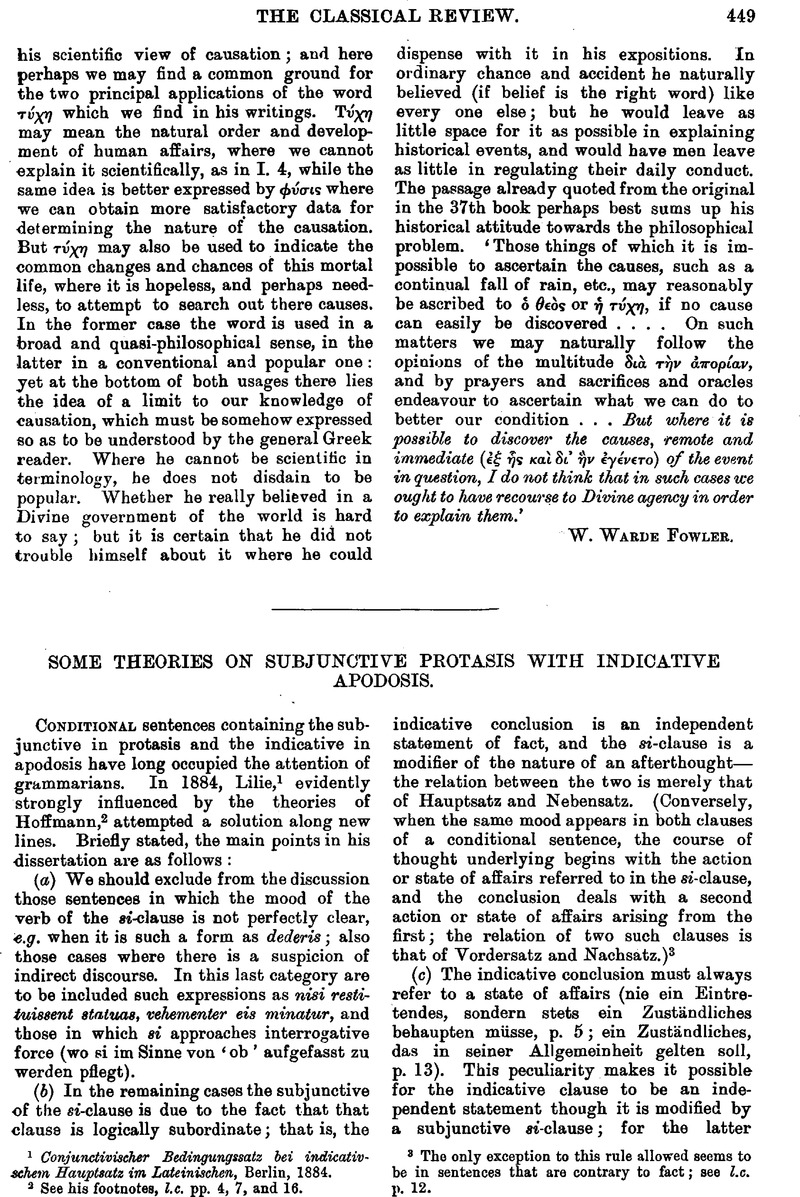No CrossRef data available.
Published online by Cambridge University Press: 27 October 2009

page 449 note 1 Conjunctivischer Bedingungssatz bei indicativschein Haupteatz im Lateinischen, Berlin, 1884Google Scholar.
page 449 note 2 See his footnotes, i.e. pp. 4, 7, and 16.
page 449 note 3 The only exception to this rule allowed seems to be in sentences that are contrary to fact; see i.e. p. 12.
page 450 note 1 But it is not explained why in such a case we do not find the same mood in both clauses.
page 450 note 2 The words ‘logically dependent’ are intended as a mere paraphrase of ‘being the expression of an afterthought’; i.e. the point of view is the intellection of the speaker, and the order in which thoughts rise in his mind. In this way the words ‘logical’ and ‘logically’ are to bo interpreted throughout the remainder of this paper. That this was Lilie's point of view appears clearly on p. 12 of his dissertation.
page 450 note 3 Amer. Jour. Phil. xxiv. pp. 25 ff.
page 451 note 1 This point is explained in detail, i.e. pp. 31 ff.
page 451 note 2 Some perhaps would not so readily grant this; any such are referred to the demonstration just given that Lilie's theory will not stand a practical test, whatever the antecedent probability of its correctness. Though no variation of mood is to be expected when the underlying thought is a Proviso Period, there is often doubtless a variation in the tone of voice.
page 452 note 1 ‘Der Konjunctiv des Präsens im Bedingungssatze,’ Wölfflin's Archiv, ix. p. 17 ffGoogle Scholar.
page 452 note 2 Delbrück's concessions along this line in his latest utterances are very significant. See Neue Jahrbücher, v. (1902), p. 317 ffGoogle Scholar.
page 453 note 1 Études sur la langue et la grammaire de Cicéron, Paris, 1901, pp. 349 ffGoogle Scholar.
page 453 note 2 See Greenough, , Trans. Amer. Phil. Assoc. ii. (1871), p. 161Google Scholar, and references in Blase, l.c. pp. 19 and 20.
page 453 note 3 On the Theory of the Ideal Condition in Latin, Studies in honour of B. L. Gildersleeve, Baltimore, 1902, pp. 253 ffGoogle Scholar.
page 454 note 1 The implied evolution of a specific contrary to fact construction through this use of the secondary tenses of the subjunctive to express a future from a point in the past would be more convincing if it should be first shown that the latter use antedates the employment of the imperfect subjunctive for the present contrary to fact; certainly the frequent occurrence of such a use is late rather than early (see Class. Bev. xr. p. 51 ff.), and already in Plantus about one fourth of the present contrary to fact sentences are using the imperfect subjunctive (Amer. Jour. Phil. xxii. p. 316).
page 454 note 2 I cannot pass unchallenged Lodge's surprising statement (l.c. p. 256) that a normal ideal conditional period consists of two members of which ‘one is not the complement of the other nor is it dependent on the other.’ Though they were otherwise applied by him, the words of Blase (l.c. p. 20) are none too emphatic for this situation : ‘Eine solche Unabhängigkeit ist bei einer regelrechten Bedingungsperiode einfach nicht möglich, da ihre Eigentümliehkeit gerade auf der gegenseitigen Abhängigkeit der beiden Satzglieder beruht.’ In the same paragraph the phrase ‘a premiss in the form of a wish’ is at least misleading.
page 455 note 1 Lodge does not notice these classes, but even among those he does recognize he admits that the future outlook is not always obvious (l.c. p. 257, class 6); the same might be said of some of the sentences quoted under (4).
page 455 note 2 Here again if is difficult to allow Lodge's statement to pass unchallenged. He bases his whole theory on the original force of the subjunctive (l.c. p. 255). This original force, he says, must have been futurity and nothing else; for it is generally agreed that ther I.E. force of the subjunctive was futurity, and this was the case of the optative also (cf. Goodwin, Greek Moods and Tenses, Appendix I). Though, as above noted, this question need not be raised, since it has been raised, we are perhaps justified in asking for a little more information about the exact meaning of this statement. For if in the I.E. period future indicative, subjunctive, and optative forms all expressed mere futurity, how were e.g. wish and exhortation expressed? There is a serious difficulty here, for that such ideas were expressed cannot be doubted, and it is just as certain that the verbforms through which they were expressed weie ipsofacto the expression of wish and exhortation. In view of Lodge's confidence in the strength of the position he takes, it may not be out of place to call, attention to the fact that a small (but, I hope, respectable) minority of scholars hold an altogether different theory with reference to early medal usage.
In the same passage, while trying to show that all. the uses of the Latin subjunctive betray this assumed original force, Lodge passes unnoticed those cases in which the si-clause is concessive or the subject of the verb is the indefinite second singular. To thesemight be added the use of the present subjunctive in early Latin for the present contrary to fact; for here there is no more future force than there is when the imperfect subjunctive is so used (e.g.) in Cicero; cf. Class. Rev. xv. p. 51 ff. The statement in the Gildersleeve-Lodge Grammar, 596 Rem. 1, is very misleading on this point.
page 455 note 3 See again Delbruck, Neue Jahr. v. p. 325 : ‘In den Einzelsprachen findet sich nicht als einzelne Gebrauchstypen bei denen der Sinn des Kasus sich ganz aus der Situation zu ergeben scheint. Von einer Grundbedeutung des Kasus hat der Sprechende nicht das geringste Bewusstsein’ (italics mine).
page 456 note 1 Vol vi. (1875), p. 44 ff.